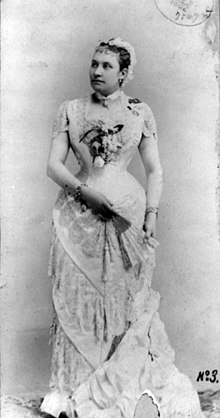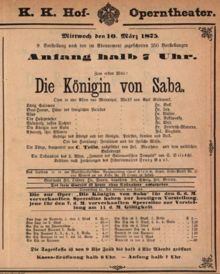Amalie Materna
Amalie Materna (also Amalia Materna , later Amalie Friedrich-Materna or Amalie Materna-Friedrich ; July 10, 1844 in Sankt Georgen an der Stiefing - January 18, 1918 in Vienna ) was an Austrian opera singer with a highly dramatic soprano voice . She was a long-time member of the ensemble , later a chamber singer at the Vienna Court Opera and famous for her powerful voice as well as her youthful timbre.
In 1875 she played the title role in the world premiere of the opera Die Königin von Saba and was the first Brünnhilde at the Bayreuth Festival the following year .
life and work
The daughter of the school teacher Wenzeslaus Materna (d. 1859) and Josefa Hoik sang in the church where she was born when she was nine. She is said to have mastered the role of Ortrud in the first act of Lohengrin as a 13-year-old .
Materna came to Graz at a young age to study singing at the local music school . In 1864 she was engaged as an operetta - and antics - soubrette at the Thalia Theater in Graz , made her debut on April 3 as a craftsman in Franz von Suppè Flotte Bursche and married the folk actor and operetta singer Karl Friedrich (1840-1891). Together with her husband, she was engaged at the Vienna Carltheater in 1866 , but continued her vocal studies with the Hofkapellmeister Heinrich Joseph Esser and Heinrich Proch . Proch finally arranged for her to audition with director Franz von Dingelstedt , who immediately engaged the artist for leading roles at the Vienna Court Opera .
Vienna Court Opera
Materna made her debut with great success as Selica in Giacomo Meyerbeer's L'Africaine in the new house on the Ring in 1869 and replaced Marie Louise Dustmann-Meyer as the first female dramatic soprano.
The Materna quickly became a pillar of the ensemble and enjoyed great popularity with the public and the press. She sang the countess in Mozart's Le nozze di Figaro and Donna Anna in his Don Giovanni , took on the title roles in Cherubini's Médée and the Christoph-Willibald-Gluck operas Alceste and Armide , and embodied Leonore in Beethoven's Fidelio .
In 1874 she was the Amneris in the first series of performances of Giuseppe Verdi's Aida in Vienna . On March 10, 1875, she sang the title role in the world premiere of Karl Goldmark's Die Königin von Saba and with her dramatic design made a significant contribution to the opera's success. Her partners were Gustav Walter as Assad and Marie Wilt as Sulamith.
Bayreuth Festival
In 1874 the singer met Richard Wagner , who immediately appreciated her so much that he invited her to sing Wahnfried on the occasion of the inauguration of his Villa . In 1876, Wagner also gave Materna the central female role in his Ring des Nibelungen , Brünnhilde, which she sang in 1876 on the occasion of the first complete performance of the cycle in Bayreuth . A witness: "Valkyrie 3 ter act Most took me the last scene. Beta u [nd] Materna. […] Materna (Brünnhilde) captivating; one forgets the sharpness of her voice over the wonderful overall performance of the artist. [...] masterly: it was an effect that went deep into the heart that the Materna exercised. […] Even though Unger (Siegfried) stood there like a broomstick, the Materna glowed and played like a goddess. "
Materna was also the first Viennese Brünnhilde in Walküre (1877) and Siegfried (1878), as well as the first Berlin Brünnhilde in the first complete ring at the Victoria Theater (1881) in a production by Angelo Neumann . In 1877 she accompanied Wagner to London , where she performed highly acclaimed in his concerts in the Royal Albert Hall . In 1882 she was Kundry in the world premiere of Parsifal on the green hill. Four weeks before his death, Wagner congratulated her in Venice on her role design: “Thank you for your great and grandiose nature, which has come into my life like a fulfilled need - God, when I think of the last Kundry evenings: Adieu: love, good, best. ”In 1883 she was the first Viennese Isolde in Tristan . She sang Kundry in Bayreuth until 1891.
Triumph in America
In 1882, the conductor Theodore Thomas signed her for a Wagner concert tour to America, and in 1884 she received heavy applause during another tour of America. On January 5, 1885, she made her debut at the Metropolitan Opera in New York City , again in a Wagner role, this time as Elisabeth im Tannhäuser . At the Met she also sang Valentine in Meyerbeer's Les Huguenots , Rachel in Halévy's La juive and Brünnhilde in Die Walküre .
WJ Henderson, the critic of The New York Times , described her Brünnhilde as “a portrait of a worldwide celebrity” and “impressionant”, praising “deep feelings, expressive tones”, as well as “the beauty and range of her voice” that “met the high expectations completely fulfilled ”. In 1884 she toured the United States a third time - together with Hermann Winkelmann , Emil Scaria and Walter Damrosch's Opera Company - and once again earned heavy applause for her roles in Wagner.
After her triumph in America, Materna returned to Vienna in 1885 and sang in numerous other productions for nine years, including Amelia in Verdi's Simone Boccanegra , the Fidés in Meyerbeer's Le prophète and in another Goldmark premiere in 1886: Merlin . Furthermore, as in Prague in 1875 and throughout Germany from 1881 to 1883, she made guest appearances on major opera stages all over Europe, including at the Frankfurt Opera , the Dresden Semperoper and the Berlin State Opera Unter den Linden , 1886 in Rotterdam , 1887 in Spain and Portugal , 1889 and 1894 in Paris .
On December 21, 1894, she said goodbye to the Viennese opera audience as Elisabeth im Tannhäuser . As a result, she worked as a singing teacher (among others, her students were Elise Elizza and Hermine Kittel ) and occasionally appeared in concerts. After leaving the stage, Materna is said to have suffered from economic hardship. Her last public appearance took place in 1913, in a concert on Wagner's 100th birthday, as Kundry.
Her niece Hedwig Materna (1871 – after 1912) also became a highly dramatic singer, her nephew Leopold Materna (1872–1948) became a conductor.
Role models
The role images from La juive , Queen of Saba and Lohengrin come from the Vienna Court Opera , the first two around 1875, the latter around 1885. The images as Brünnhilde (1876) and Kundry (1882) come from Bayreuth . The role image as Elisabeth im Tannhäuser was created in New York in 1885 on the occasion of the singer's triumphant debut at the Metropolitan Opera .
Honors
Materna was made an honorary member of the Society of Friends of Music in Vienna in 1888.
The singer was buried in an honorary grave at the Vienna Central Cemetery , in the so-called composers group (32A), thus in the immediate vicinity of the final resting places of Beethoven , Brahms , Schubert and the Strauss dynasty . A memorial plaque in the foyer of the Bayreuth Festspielhaus commemorates those who participated in the premiere of Götterdämmerung , including Materna. In Vienna- Ottakring , the Maternaweg was named after her.
Remarks
- ↑ According to another source, she is said to have sung Brünnhilde in Die Walküre as a farewell performance on December 30, 1894 .
literature
- A. Ehrlich : Famous singers past and present. A collection of 91 biographies and 90 portraits . Leipzig 1895, pp. 120-122 - Internet Archive
- Ludwig Eisenberg : Amalie Materna . In: Large biographical lexicon of the German stage in the XIX. Century. Paul List, Leipzig 1903, p. 650 ( daten.digitale-sammlungen.de ).
- Materna, Amalie . In: James Grant Wilson, John Fiske (Eds.): Appletons' Cyclopædia of American Biography . tape 4 : Lodge - Pickens . D. Appleton and Company, New York 1888, p. 251 (English, full text [ Wikisource ]).
- Edith Marktl: Materna (actually Friedrich), Amalia. In: New German Biography (NDB). Volume 16, Duncker & Humblot, Berlin 1990, ISBN 3-428-00197-4 , p. 367 f. ( Digitized version ).
- E. Marktl: Materna, Amalia. In: Austrian Biographical Lexicon 1815–1950 (ÖBL). Volume 6, Verlag der Österreichischen Akademie der Wissenschaften, Vienna 1975, ISBN 3-7001-0128-7 , p. 139.
Web links
- Literary and cultural history handbook of Styria in the 19th century , accessed on June 1, 2014
- Amalie Materna from Great Singers of the Past , accessed November 4, 2016
- Elizabeth Forbes: Amalie Materna . In: L. Macy (ed.): Grove Music Online (Accessed October 20, 2008), (subscription access) (English)
Individual evidence
- ^ August Klughardt : Selected documents and materials on life and work (PDF) With a report on the first Bayreuth Festival in 1876. University of Potsdam 2002
- ^ WJ Henderson: Met Performance CID: 3450 - Die Walküre {1} Metropolitan Opera House: 01/30/1885 . MetOpera Database. Retrieved June 24, 2014.
| personal data | |
|---|---|
| SURNAME | Materna, Amalie |
| ALTERNATIVE NAMES | Materna, Amalia; Friedrich-Materna, Amalie (full name); Materna-Friedrich, Amalie (full name) |
| BRIEF DESCRIPTION | Austrian opera singer with a highly dramatic soprano voice |
| DATE OF BIRTH | July 10, 1844 |
| PLACE OF BIRTH | Sankt Georgen an der Stiefing |
| DATE OF DEATH | January 18, 1918 |
| Place of death | Vienna |








